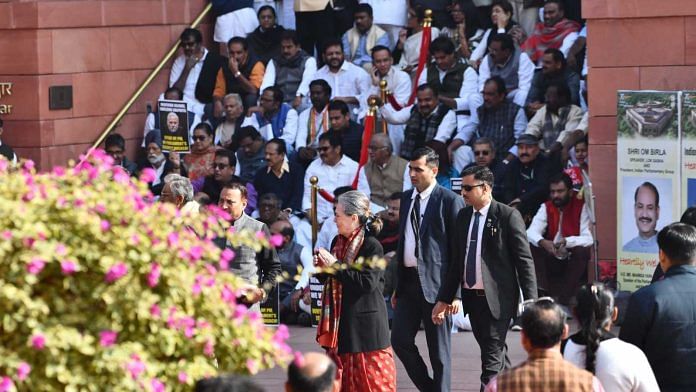Nearly two-thirds of the opposition MPs—141 in total—stand suspended from Parliament for the remainder of the Winter Session, which ends on 22 December. Under the rules of the Lok Sabha, all that this unprecedented move required was an order from the Speaker/Chairman of the House. That Lok Sabha Speaker Om Birla and Rajya Sabha Chairman Jagdeep Dhankhar, themselves elected on a party ticket, could simply suspend two-thirds of the opposition may seem surprising to some. The Indian Constitution, however, places immense trust in the office of the presiding officers. This trust is rooted in an idealised image, perhaps inspired by the relatively impartial conduct of India’s first Lok Sabha Speaker, GV Mavalankar.
“The robes of the Speaker do change and elevate the man inside,” observed the Supreme Court in Kihoto Hollohan v Zachillhu, where it upheld the Speaker’s power to decide anti-defection cases. The idea that the Speaker exists on a plane above the world of party politics does not hold water if we observe how a Lok Sabha speaker is elected or removed from the House — by a simple majority. Once we understand the realities of the office, any claims of impartiality are likely to be far from true barring a few episodic exceptions.
Constitutionality
More recent judicial interventions have remedied, to some extent, this naive account of the Speaker’s office. The BJP, too, has been at the receiving end of the Speaker’s partisanship. In July 2021, when the BJP was still in opposition in Maharashtra, its 12 MLAs were suspended from the state assembly for causing ‘gross disorder’. When the Speaker attempted to read out a resolution, the MLAs entered the well of the House and pulled up the microphone, forcing the Speaker to adjourn the proceedings. When the proceedings commenced, the assembly voted to suspend the 12 MLAs. The MLAs approached the Supreme Court, which declared that the decision was unlawful. If opposition members could be suspended by majority votes, the Court observed, “the Opposition will not be able to effectively participate in the discussion/debate in the House owing to the constant fear of its members being suspended…That would not be healthy for the democracy as a whole.”
The year-long suspension of 12 BJP MLAs was as unjustified as the suspension of 141 opposition MPs now. As the Maharashtra case demonstrates, the existence of the Speaker’s power under the Lok Sabha rules does not guarantee the constitutionality of their exercise. Similarly, the constitutionality of the Speaker’s decision cannot be protected by it being an internal matter of the legislature. As CJI DY Chandrachud’s judgment in the recent Shiv Sena case concluded, the constitutionality of internal proceedings of a legislature is not a question of ‘the source of power’. Instead, we need to ask how it impacts ‘the democratic functioning of Parliament’.
In a parliamentary democracy, there are few things more concerning than the suspension of the two-thirds of the opposition. These developments point towards a slow but steady abandonment of the ideal that Parliament is an assembly of high-minded debaters, and the Speaker is an enlightened referee. Instead, Parliament is as much a site for partisan contests as electoral campaigns. That opposition parties convert the parliamentary process into an extension of their electoral campaign is not a threat to Parliament but the best insurance of its relevance in Indian democracy.
Also read: Disruptions are as much a part of Indian Parliament now as British rules and rituals
Disruptions and opposition agenda-setting
One of the justifications for these suspensions is that the opposition MPs were “disrupting” the proceedings. Parliamentary disruptions have become a mainstay of opposition parties in India. Such disruptions were common occurrences during the UPA years.
One of the reasons that the opposition parties are incentivised to cause disruptions is that the legislative procedure does not sufficiently recognise the role of opposition parties in national or state-level legislatures. In India, a party with the majority in the Lok Sabha does not only control law-making, as it should, but for all practical purposes, it also controls the rules of the parliamentary game. If the Opposition does not find adequate space within the rules of the game, it steps out of the game altogether.
It is not surprising that perhaps the most articulate defence for disruptions came from Arun Jaitley in 2012. Jaitley, then-Leader of the Opposition in Rajya Sabha, argued that parliamentary obstruction is “a legitimate tactic of the Opposition”, if “parliamentary accountability is subverted and a debate is intended to be used merely to put a lid on parliamentary accountability”.
If we are genuinely concerned with remedying the problem of disruptions, en masse suspension is hardly a long-term solution. Perhaps a way forward is to set aside specific days each parliamentary session for the opposition’s agenda in national and state-level legislatures. For instance, the House of Commons in the UK has developed a system of ‘opposition days’, when the opposition is in control of the agenda of the House. Similarly, the French Constitution guarantees the Opposition groups the control of the legislative agenda one day per month.
If India’s opposition parties can set the agenda for even one or two days each session, they may have fewer incentives to disrupt. Moreover, once this responsibility of leading the business of the House dawns on the opposition parties, they may also be more responsible in their parliamentary conduct. After all, the governing parties, too, could disrupt opposition days.
The author is a PhD (law) candidate at University of Cambridge. He tweets @sethiaaradhya. Views are personal.
(Edited by Prashant)



